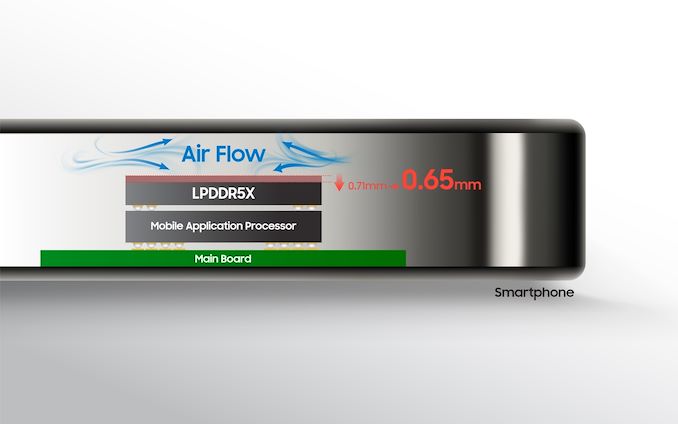Samsung is announcing today that it has begun mass production of 12 GB and 16 GB LPDDR5X modules in the industry’s thinnest package. Samsung’s shrunken memory packages measure approximately 0.65 mm in thickness, making them 0.06 mm (~9%) thinner than standard LPDDR5X packages. The company expects the new DRAM devices to be used to make for thinner smartphones, or improve their performance by enabling better airflow inside.
According to the company’s press release, Samsung achieved this ultra-thin design by employing new packaging methods, such as optimized printed circuit boards (PCBs) and epoxy molding compound (EMC). Additionally, an optimized back-lapping process was used to further reduce the height of the packages. The newly developed DRAM packages are not only thinner by 9% compared to previous models but also offer a 21.2% improvement in heat resistance.
Thinner LPDDR5X packaging help enhance airflow within smartphones, significantly improving thermal management, which means higher performance and longer battery life. Also, better thermal management help to prolong device’s lifespan.
“Samsung’s LPDDR5X DRAM sets a new standard for high-performance on-device AI solutions, offering not only superior LPDDR performance but also advanced thermal management in an ultra-compact package,” said YongCheol Bae, Executive Vice President of Memory Product Planning at Samsung Electronics. “We are committed to continuous innovation through close collaboration with our customers, delivering solutions that meet the future needs of the low-power DRAM market.”
While Samsung’s thinner LPDDR5X DRAM packages contribute to making smartphones slimmer, they are just one part of the overall design strategy. Other components, such as thinner protective glass, PCBs, and batteries, play considerably more significant roles in reducing device thickness. Meanwhile, the primary benefit of these new memory modules may be in improving airflow inside smartphones.
Samsung is looking to further expand its LPDDR5X product lineups by developing even more compact packages, including 6-layer 24 GB and 8-layer 32 GB modules. Specific details about the thickness of these future memory modules have not yet been disclosed, though making high-capacity DRAMs thinner in general is an important thing.



